Peter MALONE
Saturday, 18 September 2021 19:54
Disappearance of Eleanor Rigby, The
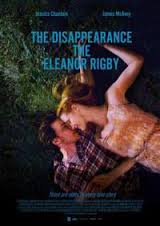
THE DISAPPEARANCE OF ELEANOR RIGBY - THEM
US, 2014, 122 minutes, Colour.
Jessica Chastain, James Mc Avoy, Nina Arianda, Jess Weixel, Bill Hader, William Hurt, Isabelle Huppert.
Directed by Ned Benson.
The release of The Disappearance of Eleanor Rigby – Them will cause some problems for film buffs who have heard that prior to the editing of this film there was a version of The Disappearance of Eleanor Rigby which focused on Eleanor with the caption Her and, as well, there was a version with the caption Him. Distributors have opted to release Her and Him by download and DVD and to release only Them to cinemas. For any audiences who have seen Her and Him, the selection of material edited together from the previous film in Them, will be of interest to see the intercutting of the two perspectives. For those see Them first, looking at the previous two firms might be similar to the experience of seeing a film and then reading the book on which it was based later, filling in a great deal of detail and highlighting how different perspectives can be.
One of the difficulties, dramatically, with Them is that there are some crises Eleanor’s life but it is only later in the film that we discover what they are and how significant they are. There are initially playful moments but then a rapid transition to Eleanor contemplating suicide. Her husband visits her in hospital but she opts to stay with her parents. He tries to cope, working in his restaurant which is going down in terms of customers. And he has to go to live without his sometimes cantankerous father (Ciaran Hinds).
On the surface it seems a portrait of a failed marriage but it becomes clear that husband and wife do love each other but attempts at reconciliation are ineffectual.
Jessica Chastain portrays Eleanor, in her 30s, a woman floating through life after the crisis. Her loving parents, long-married (William Hurt and Isabelle Huppert) are supportive as is her sister. She attempts to do some studies with the help of the professor (Viola Davis). James McAvoy? portrays Conor, also in his 30s, who has grieved, adrift in his work, relying on the support of friends at the restaurant, especially Stuart (Bill Hader).
The film shows a number of attempts for each of the couple to try to understand the other, moments of betrayal, moments of love, moments of hesitation.
Finally, both Eleanor and Conor have some time away from each other, with the possibility that things might get better, a glimmer of hope rather than despair.
1. The original films: Him, Her, the different emphases on Eleanor and Conor, the different perspectives, on the same events?
2. This film and the combination of footage, the effect, inclusions and omissions, the order of events?
3. The title, the Beatles song, her parents calling Eleanor after the song, the quotations by the professor?
4. Audience sympathies, towards each of the characters, changes? The ending?
5. The key information about the child’s death, the late revelation of this fact, its impact, the visuals, Eleanor with the pram and the dolls, finally seeing the photo which was taken from the wall?
6. The opening, the light touch, the couple having the meal, not wanting to pay, making their escape, the chase, in the park, love? The transition to Eleanor on the bridge, her jumping, the rescue from the water, in hospital, Conor and his visit, her not knowing, her leaving with her sister, going to her parents’ home, their welcoming her, taking the picture from the wall?
7. Conor, alone, his regrets, the audience not knowing about the death of the child? Going to his father, his ability to talk with him, or not? Memories of his mother? His work in the restaurant, little custom, the staff, interactions, Stuart and his friendship, the jokes, the fight, the apartment? The expenses for the restaurant, possibility of closing? His father, the successful restaurant, talking about the old customers, the Rolling Stones, the name of the restaurant, Anna, after the father’s wife, his third wife leaving him, offering the restaurant to his son?
8. Eleanor, cutting her hair, different appearance, in the street, the chance encounter with Stuart? Going to the University, sitting on the floor, the interview with the professor, her studies, change of heart, the professor talking about heartbreak? Her character, her own life, a sounding board for Eleanor?
9. Eleanor going out, driving, with Conor, in the car, getting wet, Conor talking about his infidelity? Her reaction? Going to the club, the man, going to the room, stopping?
10. The different interactions between the couple, Conor packing, the visit, her putting the blanket on her husband, genuine love?
11. The portrait of Eleanor’s parents, professor, French mother, the past, the memories, welcoming her, the dancing together and their daughter watching?
The decision to go to Paris?
12. One year passing, Eleanor and her return after the experience, its effect? Conor and his doing accounts in his father’s restaurant? Walking through the park, Eleanor following him? A sign of hope?
Published in Movie Reviews
Published in
Movie Reviews
Tagged under
Saturday, 18 September 2021 19:54
Keeping Up with the Steins
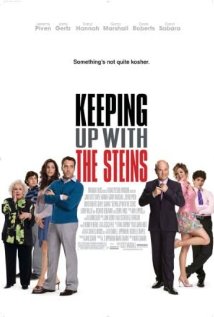
KEEPING UP WITH THE STEINS
US, 2004, 90 minutes, Colour.
Daryl Sabara, Jami Gertz, Jeremy Piven, Cheryl Hines, Larry Miller, Richard Benjamin, Britt Robertson, Doris Roberts, Daryl Hannah, Gary Marshall, Neil Diamond.
Directed by Scott Marshall.
Keeping up with the Steins is an amusing comedy, very American, very Jewish.
This is a film about a Bar Mitzvah and the rivalry in the celebration afterwards. The Steins have an expensive feast based on Titanic theme. Adam Fiedler, Jeremy Piven in a very effective frantic performance, is envious and wants the best for his own son, Benjamin, Daryl Sabara. His wife, Joanne, Jami Gertz, is much more sensible. Also at home is Adam’s mother, Rose, played by Doris Roberts.
There is a lot of discussion and planning about an elaborate Bar Mitzvah celebration with a baseball theme, presided over by Cheryl Hines as the event planner.
Complications arise when Benjamin invites his grandfather, Adam’s father, to come not only to the Bar Mitzvah, but changes the dates so that he comes earlier. He has been living on a native American reservation with his girlfriend, Sacred Feather, an engaging performance by Daryl Hannah, companion, nice, in touch with nature, vegan.
This means a lot of complications on a family level with Rose much more willing to forgive her former husband than will her son. Benjamin Bonds with his grandfather who comes to the rehearsals and has a good talk to the Rabbi, Richard Benjamin, persuading him to talk very personally with Benjamin about the ceremony.
Benjamin changes his mind about the baseball theme and the celebration is held at home, marred initially by the clash between Adam and his father, ending with a forced reconciliation at Benjamin’s wish.
The film was directed by Scott Marshall, Gary Marshall’s father – who puts his father through quite a few hoops in his performance here, including the swimming pool sequence.
1. An American comedy? Jewish comedy? Comical, satiric? The title and the rivalry?
2. Los Angeles, the neighbourhoods, Temple, the lessons from the rabbinic school, homes, the world of entrepreneurs, agents? Wealth? the big names and celebrities? The showbiz background?
3. The strong cast, comic talent?
4. Benjamin and his story? A quiet boy, awkward? His mother and her loving kindness? His father, his ambitions, work as an agent? Grandmother Rose? His friend, Zachary Stein, at school, in class, the girls, his awkwardness? The preparation for the Bar Mitzvah? His fears, his voice, unable to speak, the teacher and his encouragement? The visits from the Rabbi to the class?
5. The Stein Bar Mitzvah, Titanic, the extravagance, the boat, the organisation, the whole ambition of the Steins?
6. Adam and Joanne, Adam and his envy? Plans, the organiser, the pressures on Benjamin, his random choice of baseball, the consequent plans, celebrities, the field? His change of mind? The expense, his parents’ reactions?
7. At home, his mother ordinary and nice, Adam being driven, Rose and her presence, saying she wouldn’t intervene? Memories of the past, though Irwin abandoning them 27 years earlier, the effect? Rose’s memories? Adam’s resentments?
8. The invitations, Benjamin sending one to Irwin? His putting the wrong date for them to arrive early?
9. The introduction to oh when, to Sacred Feather, on the reservation, the teaching, lifestyle, nature, Sandy as a vegan? His crusty attitudes? Her niceness? The decision to go, the arrival, the different reactions, Adam and his hostility, Rose and her arrival back, surprise, welcoming? Joanne and her kindness? Benjamin, talking with his grandfather, going fishing, getting the seaweed, bonding? The trailer in the driveway?
10. Rose, reacting, her hug, the memories, saying the two were at fault, forgiveness, the meals, conversation? Irwin in the swimming pool and Adam’s reaction? His continually being rude to his father?
11. The lessons, Benjamin and his fear, the girls, the rehearsal, his grandfather attending, promising the pony to the girl for her presence? The discussion with the Rabbi, his being correct about the Rabbi becoming involved? The Rabbi and the very good talk with Benjamin?
12. The Bar Mitzvah at home, pleasant, the organiser, the ceremony, the music, apprehensions, Adam’s attitude? Success?
13. The showdown with Irwin, the argument, at the party, going into the pool? Benjamin wishing the two to reconcile?
14. The Steins at the Bar Mitzvah, their observations – with the touch of envy?
15. The satire, the parody – but hopeful?
Published in Movie Reviews
Published in
Movie Reviews
Tagged under
Saturday, 18 September 2021 19:54
Sherlock Holmes Faces Death
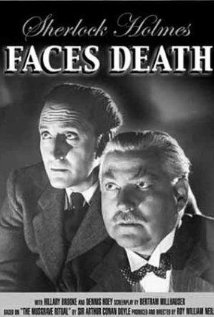
SHERLOCK HOLMES FACES DEATH
US, 1943, 68 minutes, Black and white.
Basil Rathbone, Nigel Bruce, Dennis Hoey, Arthur Margetson, Hillary Brooke, Halliwell Hobbes.
Directed by Roy William Neill.
This is one of the 14 films in the series of Sherlock Holmes stories with Basil Rathbone and Nigel Bruce. Several of them had inspected Lestrade, played by Dennis Hoey, who appears in this film.
The screenplay is based on Conan Doyle’s story, The Musgrave Ritual. The setting is Northumberland, an institution for military personnel and their recovery, the post-traumatic stress of that period. Doctor Watson is on call and asks for Holmes’ assistance when the Lord of the Manor is killed.
The various suspects, including some of the personnel, the alcoholic butler protected by his wife, and the local doctor who helps in the investigations. There are further murders, the discovery of a basement, a document from the time of Henry VIII concerning the property. When her second brother is killed, the only Musgrave survival is the sister, played by Hillary Brooke, who must go through the ritual.
Holmes ingeniously tricks the murderer to reveal himself, homes risking his life – and, therefore, facing death. This is an enjoyable further addition to Holmes exercising his logic and focus on facts, elementary, along with the ever-bumbling Nigel Bruce.
1. The popularity of the series? Basil Rathbone? Nigel Bruce? The mystery? The usual ingredients for these films?
2. The basis in Conan Doyle’s story? The Musgrave family, the age-old ritual?
3. The title, Holmes and his investigation, the confrontation with the murderer, his pretending to be dead, the confrontation and unmasking the villain?
4. Northumberland, the home, the patients, post-traumatic stress, the range of illnesses, the doctor, Dr Watson in attendance?
5. Dr Sexton, his help, collaborating with Holmes? His work in the institution?
6. Geoffrey Musgrave, the Lord, his death, the death of his brother, the reading of the will?
7. Sally, inheritance, performing the ritual?
8. Brunton, the butler, his drinking, the influence of Dr Sexton, his disappearance, death? The concern of his wife?
9. The arrival of Inspector Lestrade, his usual bumbling self, drawing the wrong conclusions, taking some credit?
10. Holmes and the re-enactment of the ritual, the floor as a chessboard, leading to the basement? The members of the staff as the chess pieces, Sexton and his involvement, his making a wrong move? Holmes’ realisation?
11. The basement, the butler and his death, Holmes and his pretence?
12. Sexton, his actions, unmasked, his motivation, planning to marry Sally, the Henry VIII document, his marrying her and becoming wealthy?
13. Sally, the burning of the document, her concern about the tenants?
14. An authentic Conan Doyle’s story and the cinema treatment?
Published in Movie Reviews
Published in
Movie Reviews
Tagged under
Saturday, 18 September 2021 19:54
Top Five
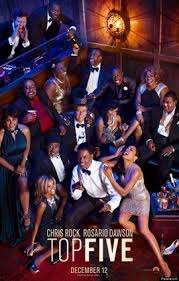
TOP FIVE
US, 2015, 100 minutes, Colour.
Chris Rock, Rosario Dawson, Cedric the Entertainer, Tracy Morgan,.
Directed by Chris Rock.
If you have never heard of, Chris Rock, or never heard of Cedric The Entertainer, or Tracy Morgan…, this is probably not the film for you. As an extra caution, it might be added that even if you had heard them, this still might not be the film for you.
Over the decades, Chris Rock has built a substantial reputation as a stand-up comedian, and has proven himself to be something film star as well. Using the tradition of Richard Pryor and Eddie Murphy, African- American humour, targeting American politics, the American way of life, often with sexual innuendo – and at other times, quite explicit and crass. There is something of a glimpse of this at one stage in Top Five, but the film is really about a celebrity and how he deals with his life and its pressures.
The film opens with Andre (Chris Rock) walking along the street with a journalist, Chelsea (Rosario Dawson) talking about his life, willingly and unwillingly, some wry comments as well as wisecracks. And then we find out who Andre is. He has become something of a celebrity because of his starring role in three action-hero blockbusters. The trouble is that he plays Hammy the Bear, but concealed in his bear suit, but nonetheless he is recognised, acclaimed, signing autographs.
But he wants to be a serious actor and his new release, Uprise, has just opened with practically nobody going to see it. We are shown a clip, a story about Haitian rebels with Andre as the vigorous leader, and a massacre of white landowners. Not a masterpiece.
So, The New York Times wants an interview with him and assigns Chelsea, one of their top writers. Andre is reluctant to talk to the New York Times because their columnist, James Neilson, has targeted Andre and his performances in past years. Over a day, Chelsea follows Andre to various functions and promotions, with Andre taking the opportunity to reminisce about his life, along with memories of booze and sex early in his career (this flashback with Cedric the Entertainer, replete with some Texas mumbling and some gross behaviour). Andre also goes to see his family, a motley collection, and encounters at one stage Adam Sandler and Whoopi Goldberg and some other friends for conversation.
Are a lot of musicians and singers moving in and out of the film, many of them asked about the top five.
At the same time, Andre is trying to cope with a planned marriage on the following Saturday, his fiancee, Erica (Gabrielle Union) and devotee of Reality Television, is being filmed planning the marriage in great detail in preparation for the filming of the wedding – which seems one of the most unlikely.
Andre has been on the wagon for some years but a crisis comes about the identity of James Neilson which propels him into drinking again, face the failure of his film, question what he is really about.
While Andre is a fictitious character, any film about a stand-up comedian and actor raises the question of how much autobiography there is in it. But that is for Chris Rock fans to fathom.
1. The title, lists, throughout the film?
2. Chris Rock film? The impact? Chris Rock as stand-up comedian, writer, director, performance? His perspective on the career of this kind of comedian? Touches of autobiography?
3. A New York story, the cinema story, the New York clubs, the New York Times and articles? Streets, apartments, hotels, film promotion?
4. The musical score, the range of songs?
5. The cast, the black performers, comedians, musicians? Singers?
6. Andre and his walk with Chelsea, the interview, the discussions, information, the tone?
7. Andre’s story, the information about Hammy the Bear, the three films, action hero, in costume? The enormous popularity, autographs and fans, posters? The contrast with Uprise, the Haitian story, the slaves, cinema flop?
8. The scene with the agent, Kevin Hart and his antics, his warnings about Andre’s career?
9. The family visits and contacts throughout the film, the range of characters at home, father, mother, the others?
10. The plan for the wedding, Bravo and the filming of the preparations and the ceremony? Reality TV? How credible the relationship between Andre and Erica? Their plans? Erica and her being filmed, the sets, the preparation? The phone calls from Andre and his reactions? Credible future or not?
11. The New York Times, James Neilson and his articles, the vitriolic comments about Andre, crimes against humanity, not watching the film even if the screen was in the glasses? Andre’s anger? The final revelation that Chelsea was James Neilson, his discovery of the text on the phone?
12. Andre’s bodyguard, protection, the plans, and involvement in all the action?
13. Chelsea, at home, her daughter, her mother, her writing, publication, the magazines? With the New York Times, allotted the interview? The later revelations of the text from the editor?
14. The beginning of the interview, asking Andre to be honest, the bond between the two, passing the day together, following Andre, observing him, the film promotion? The phone calls and hopes? Andre and his going to the cinema – few people watching, only on one screen?
15. Uprise, it story, Haiti, the uprising, the massacre of the whites? The film clip?
16. The flashbacks, Houston, Cedric the Entertainer, his gross character, performance, patter, difficult to understand, the sexual behaviour, Andre watching?
17. The flashbacks to Andre’s life, to his career?
18. Alcohol problems, AA, his experience, Chelsea, the time of being dry? His discovery that she was James Neilson, going into the bottle shop, later drinking?
19. The sequence with Adam Sandler, Whoopi Goldberg and friends, the discussion?
20. Chaplin's Song, Smile, and its being sung with a raspy voice?
21. The variety of musicians, performance, discussions, careers, their Top Five?
22. The effect of drinking, on Andre, the encounter with Chelsea?
23. The pickup, relationship, the truth? The wedding or not?
24. The impact for this film on an American audience? The detailed American information, language, style? African- American? World audiences, appreciating it or not?
Published in Movie Reviews
Published in
Movie Reviews
Tagged under
Saturday, 18 September 2021 19:54
Kidnapping Mr. Heineken
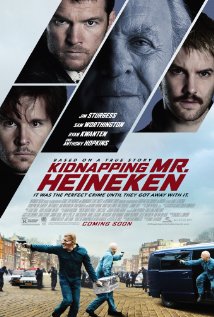
KIDNAPPING MR. HEINEKEN
Netherlands/UK, 2015, 95 minutes, Colour.
Anthony Hopkins, Jim Sturgess, Sam Worthington, Ryan Kwanten, David Densic, Jemima West, Mark van Eeuwen, Thomas Cocquerel.
Directed by Daniel Alfredson.
Being a criminal does not necessarily being a mastermind, a mistake probably many criminals make. It is certainly a mistake that the criminals involved in this kidnapping make time and time again.
And who is Mr Heineken, the victim of the abduction? It sounds something to do with the famous Dutch beer. And that is correct. Four young men kidnapped Alfred (Freddy) Heineken, the man who built up the Heineken company. The kidnappers think that he is worth at least $60 million in ransom.
During the opening credits, Heineken is seen making a comment to one of the criminals that most people want friends and money – he makes the point that you can’t have both. And that is one of the morals of this film.
The setting is Amsterdam, 1983. In the aftermath of recession, the four young men who had been friends since school days and who had joined for business enterprises find themselves needing to borrow from a bank but unable to provide sufficient collateral for a loan. They do have a building which has been occupied by punks and hippies. Some strong arm tactics lead them into the hands of the police rather than freeing up their asset.
The father of one of the men worked for Heineken who actually sacked him but still has an enormous loyalty to him. Brainwave! Using the word brain seems something of an over-compliment. One significant idea that they have is that the kidnapping should look like the actions of the terrorist groups of time, like the Red Brigade or Baader-Meinhoff?. To emphasise this, they successfully rob a bank.
This is an international production. The conspirators are played by Jim Sturgess (UK), Sam Worthington (Australia), Ryan Kwanten (Australia), Mark van Eeuan (Holland). And Heineken himself is played with his usual intensity by Anthony Hopkins.
When the money is not forthcoming, Heineken himself is surprised and offers to pay the ransom himself, for himself and the driver who was taken with him. Of course, the four begin to get edgy as the days pass, some tempted to be violent, others preoccupied about keeping up normal appearances, visits to family, checking on Heineken’s desires, books, Chinese food…
For those not in the know, it is interesting to see how the whole plan works out, the eventual payment, the subsequent actions of the four men, the consequences for them. Interestingly, though the police are involved, the screenplay, based on the writing of investigative journalist, Peter De Vries, does not give any information about the police work except some surveillance and the response to an anonymous tip.
At the end of the film, there is substantial information given about each of the main characters, prison sentences, life after prison, criminal activity in Holland, and the continued success of Heineken himself who, on the basis of his experience, establishes a strong Security company.
1. Official? Abduction and the consequences?
2. True story, Heineken, his beer empire? The security company after the ordeal? The picture of the group, childhood friends, adult co-workers? The action, the aftermath, the sentences?
3. Amsterdam, the 1980s, the city, beauty, canals, streets, homes, the industrial area, the countryside, Paris? The musical score?
4. The introduction with Heineken, his talk about money, talk about friends? His winking and continuing throughout the film, even in the television interview at the end?
5. Friends, the need for money, the long friendship, going to the bank, not having collateral, the building, the fight with the punks occupying it, the police arrival, the clash, jail?
6. The background of the young men, Cat and his family and children? Cor, the relationship with Sonia, casual, her pregnancy? Willem, angry, the clashes with his father, the scenes at home, the meals, his mother and cooking, Sonia as his sister? Spikes, erratic? Brakes, younger, following?
7. The background of the father working for Heineken, being sacked by him, yet his loyalty? Cor and his brainwave, to abduct Heineken, the lure of the millions for ransom? The plan, the agreement, wanting to look professional, like the terrorist groups of the period? The decision to rob the bank, the masks, their escape, the car, the boat? Cat and his providing the building, building the room, making it soundproof, the testing?
8. The execution of the abduction, taking Heineken and his driver? Interning them?
9. Heineken’s character, self assured, easy, his requests, food, books, music? His reaction to Brakes, not saying anything? His being satisfied with the books, the Chinese food? The potential for violence and the attack on him? The days passing? Communication with his driver, the driver being afraid? The conversations being recorded?
10. The weakness of the group, the ransom notice and its being left on the photocopier? Going to the hotel, the bar, suspecting that police were observing them? Trying to be normal, in and out of the building, the meals at home, the discussions? Time passing, wondering about the ransom, its not being paid? Heineken and his reaction? Willem being prone to violence? Not hurting Heineken?
11. Cat, his hesitations? Brakes and his bringing the food?
12. The police watching, the anonymous tip, the film not giving information on the police work?
13. The TV coverage, speculation?
14. The note in the paper, agreeing to pay the ransom? Dictating the terms and the directions to the driver? The vehicle, throwing the money over the bridge, collecting the money, returning, the joke about the police?
15. Dividing money, Breaks able to go, his being caught? Cat driving, his arrest? Spikes, his paranoia, going with the group, fighting with Willem, leaving? The news about his being in a mental institution, the arrest, going to Paraguay, Peter De Vries tracking him down, his return, arrest?
16. Paris, the effect on Cor and Willem, forbidding Cor to ring Sonia, his anxiety, phoning, going into the street, the arrest?
17. The consequences, prison terms, Cor and Willem being involved in crime? Heineken and developing his Security Company?
Published in Movie Reviews
Published in
Movie Reviews
Tagged under
Saturday, 18 September 2021 19:54
Fountain, The/ 1934
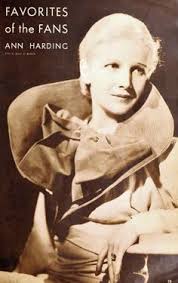
THE FOUNTAIN
US, 1934, 82 minutes, Black-and-white.
Ann Harding, Brian Aherne, Paul Lukas, Jean Hersholt, Ralph Forbes, Sara Haden.
Directed by John Cromwell.
The Fountain is a story of World War I, with a setting in Holland in 1916. Which means that this treatment of the war was made only 18 years from the time of the action.
The film is not so watchable these days. It is heavy with dialogue, some philosophical reflections about the nature of goodness and the fountain of righteousness from within a person. It is also rather stilted in some of the performances, especially Brian Aherne, as a writer captured during the war, involved in an attempt to escape from a prisoner of war camp in Holland, taking refuge in a Dutch family mansion, in love with the wife of a German officer (Paul Lukas), having met her in Oxford days. Ann Harding is the wife, tormented by her love for the writer and her duty towards her husband who has been wounded on the German front.
The treatment is somewhat melodramatic, highly romantic in the scenes between the couple in love, strong pathos in the scenes between the wife and her invalid husband. But there is also some jealous intrigue, instigated by Sarah Hayden, later to be the sweetness and light aren’t of Andy Hardy.
The film was directed by veteran John Cromwell, a celebrated director, especially during the 1930s and 40s, films including The Prisoner of Zenda, Anna and the King of Siam, The Goddess.
Published in Movie Reviews
Published in
Movie Reviews
Tagged under
Saturday, 18 September 2021 19:54
Tombstone
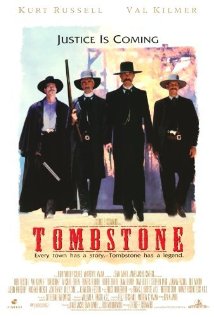
TOMBSTONE
US, 1993, 130 minutes, Colour.
Kurt Russell, Val Kilmer, Sam Elliott, Bill Paxton, Powers Boothe, Michael Biehn, Charlton Heston, Jason Priestley, Jon Tenny, Stephen Lang, Thomas Hayden Church, Dana Delany, Dana Wheeler -Nicholson, Joanna Pacula, Michael Rooker, Harry Carey Jr, Billy Bob Thornton, Paul Ben- Victor, Robert Burke, Billy Zane, John Corbett, Terry O’ Quinn, Frank Stallone, Pedro Armendariz Jr, narrated by Robert Mitchum.
Directed by George Pan Cosmatos.
Once again Wyatt Earp and Doc Holliday at the OK Corral, this time quite spectacularly in George Pan Cosmatos large-scale Western. The sweep and style of the photography, locations and sets are impressive. The cast has many names. However, they tend to be character actors rather than stars. Kurt Russell is a solid, sometimes stolid Wyatt Earp, while Val Kilmer stands out as the educated consumptive but deadly Holliday. Villains include Michael Biehn and Powers Boothe. The Earps include Sam Elliott and Bill Paxton. Dana Delany is the actress who becomes Earp’s wife.
Robert Mitchum supplies the narration, along with some real and some fictitious silent footage, an introduction about the lawless cowboys and their brutality and the need for law and order in the frontier towns like Tombstone.
The interpretation of Wyatt Earp and his stances is an 1980s aggressive use of law and order and violence, the old Clint Eastwood creed. However, the screenplay also includes the 1990s ultimate wariness of violence, the Eastwood dilemma of Unforgiven. Which means that there is an ambiguity in audience response, the gung-ho support of the gunning down of vicious killers and moral questions of the righteous spree of violent law enforcement. It is a rousing western, raising issues of violence.
1. In the tradition of the classic westerns? Wyatt Earp and cinema traditions, interpretation of his character, stances, Law and order, The Gunfight at the OK Corral? Doc Holliday?
2. The voice-over, Robert Mitchum, the post-war West, more pioneers moving west, the discovery of silver in Arizona, the setting up of the Cowboys, their lawlessness, the need for order?
3. The strong cast, the musical score?
4. Wyatt Earp, his reputation in Dodge City, the reason for moving to Tombstone, the discovery of silver, money, his interest in gambling? His brothers, Vergil and Morgan? Their wives, Mattie and her relationship with Wyatt, the need for laudanum, buying it, deceitful use, the effect on her? The visit to the saloon, the lack of business? Taking over the saloon, the gambling, success?
5. The prologue: Curley Bill, Ringo, the Cowboys, the wedding, the shootings, the confrontation with the Friar, his death, their brutality? The Cowboys and their deaths, the distinctive red sash?
6. The role of the Sheriff in Tombstone, the marshals, the Mayor?
7. Josephine, attractive, making Wyatt uncomfortable, his relationship with his wife, her jealousy? Performance in the saloon, sultry, yet shocked at the killings, supporting Wyatt?
8. Curley Bill, drunk, shooting, killings, the death of the Sheriff in the street? Vergil and his decision to become law enforcement? Morgan following?
9. Doc Holliday, his reputation, gambler, skill, witty, angry opponents, his staying calm, quick on the draw, his girlfriend and support, the clash with Ringo, his juggling his gun, Doc juggling the cup? Suffering from consumption and its effect on him? The friendship with Wyatt?
10. The Clintons, the rivalry, in league with the Cowboys, the guns, some of the shooters and their changing sides, leaving the Cowboys? Building up an alliance, leading up to the Gunfight at the OK Corral? The shootout? Ike and his surviving? The later confrontation and his death?
11. The characters in the town, in the saloon, amongst the Cowboys, the drinking, the violence? The buildup of the Cowboys, Ringo and his cruelty?
12. Injuries to Vergil, the death of Morgan? Wyatt, the policies, the pursuit, the barrage of killings? The decision to destroy the Cowboys? Doc and his participation in the killings, the confrontation with Ringo and Doc and his smart deception?
13. Josephine, the relationship with Wyatt? His alienation from his wife?
14. The establishment of law and order, Wyatt and Josephine leaving, going to California, time in Hollywood?
15. Information about the relationship for 47 years? Wyatt and his death, Tom Mix and the other cowboy stars attending his funeral? His place in American western mythology?
Published in Movie Reviews
Published in
Movie Reviews
Tagged under
Saturday, 18 September 2021 19:54
Mimic 2
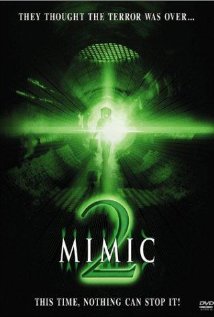
MIMIC 2
US, 2001, 82 minutes, Colour.
Alex Koromzay, Bruno Campos, Will Este, Gaven E. Lucas, Edward Albert, John Polito.
Directed by Jean de Segonzac.
Mimic 2 follows on from the original Mimic, starring Jeremy Northam and Mia Sorvino. It is a story of experimentation, genetic mutation, the development of giant cockroaches and their menace to humans. This is a more modest film, interesting nonetheless.
It begins with information about the menace to humans and focuses on a man emerging from the New York subway into a somewhat dilapidated New York City, but attacked and transformed into a mutation, losing his face which becomes part of the mutation. Several other characters have the same experience, men associated with Remi, a teacher in a Bronx school who was involved in the experiments.
Detective Klaski begins to investigate and gets caught up in the dangers, being trapped in the school with Remi, and with a teenager brutalised by his father and the young black boy who has no home to go to.
The film capitalises on its special effects, the touch of gore, the transformation of humans into cockroaches – something especially seen at the end, with a touch of pathos, and with the touch of menace which leaves the story open to a further sequel.
1. The popularity of the original film? The characters? The situation? Science, transformations, mutations, threats to civilisation?
2. This film continuing the story, the focus on Remi, on those associated with her, their deaths, the transformations, the menace to Remi, the police investigation, the teenager, the young boy, involved with her, the buildup to the menace?
3. The colour photography, the garish look of New York City, the subway, the Bronx, apartments, schools?
4. The special effects, the action sequences? The touches of horror and gore?
5. Remi, at school, her classes, her interests in insects, the specimens at home, her work, the book? Her involvement in the experiments? Her reclusive dinners, the men, the outings, the flowers, the men being transformed? At school, her dismissal? The transformation of the principal? The encounter with Klaski, his investigations, attraction, protection? The military and their intervention? The young boy, his brutal father? The black boy, making up stories about home? Trapped in the school, the principal and the change? Klaski and his intervention, trapped in the room, Remi and has sent, the creatures in the war, the plan with her clothes, the escape of the boys, Klasski going in, his rescuing Remi, in hospital? Her waking, going home, the boy, the knock on the door, the transformed Klasski, the ending with menace?
6. The teenager, at school, wanting a date, his father bashing him, hiding in the school, the menace, the device of the clothes, his being saved?
7. The young black boy, friendly, having a home, making up stories, devoted to Remi, trapped in the school, his escape?
8. Klaski, tough New York police, on-the-job, fellow officers, the confrontation with the military authority, interviewing Remi, curious about her interests, the book? Reading it? The attraction, going into the building, rescuing Remi, the end and his transformation?
9. The military, the involvement in the experiments, the confrontation of the man in charge with Klasski?
10. The range of victims, their characters, connection with Remi?
11. A satisfactory small budget, horror film, straight to video?
Published in Movie Reviews
Published in
Movie Reviews
Tagged under
Saturday, 18 September 2021 19:54
Mimic: Sentinel
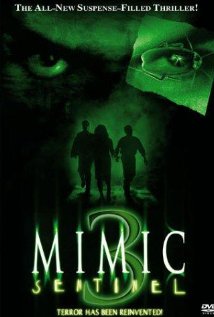
MIMIC: SENTINEL
US, 2003, 78 minutes, Colour.
Lance Henriksen, Karl Geary, Alexis Dziena, Keith Robinson, Rebecca Mader.
Directed by J.T.Petty.
Judging by the comments from bloggers, fans are divided about their like and dislike for this third film in the Mimic series.
For those who do not like the film, they consider it to talkie, confined to a room, lacking action until the end, someone remarking that the cockroaches, so prevalent in the previous two films, have only the equivalent of cameo roles!
For those who do like the film, they see it as a thriller more than a horror film, a thriller with moments of horror and the climax of horror. And most film buffs who see it, with the hero confined to his room, photographing from his window, looking into the windows of apartments opposite as well as into the dark streets, it is obviously a homage to Rear Window. And there is quite a lot of footage of looking at the photographer, looking at his camera, looking through his lens and seeing what is going on via the lens.
Karl Geary portrays Marvin, who is affected by the cockroaches when the mutants roamed the city and destroyed or infected the inhabitants. He is infected and is like the boy in the plastic bubble, except that he does go into other rooms as well as into the street. His widowed mother is played by Amanda Plummer, fussy about her son, becoming emotionally involved with a visiting policeman who has inflated his reputation and authority in the force and antagonises Marvin. There is also his sister, Alexis Dziena, full of vitality, but full of drugs, who sees a killing on the street, is anxious, calls the police, goes across the street (another reminder of Rear Window) with a young woman, Carmen, Rebecca Mader, whom Marvin sees, studies, and who comes to visit him (giving up smoking and perfume so that he will not be having breathing into his respirator).
Down on the street is a man, amongst the many that Marvin photographs and puts on his wall, and they identify as the garbage man (Lance Henriksen). There is also another mysterious character called Birdman. At the beginning of the film, a young boy is wandering the streets and is brutally killed. Those who know the other films will realise that it is the giant cockroaches at work again, nesting in the basement of buildings, the basements becoming something of cocoons – although it is mentioned that the cockroaches don’t have to be bigger, they have adapted, intelligently, and can be smaller. Nevertheless, they do emerge at times with deadly results.
The garbage man was trying to sell off some specimens, since he has been observing the cocoon and is an authority on insects, Marvin finding a book written by him. When Marvin’s sister is killed in the street, the garbage man and Carmen bring her to the room, explaining that light or fire repel the insects. When there is a knock at the door, it is the mother and she is immediately speared by the cockroaches, who then keep battering at the walls, Marvin even hiding himself in the fridge, and the garbage man dying.
Marvin reawakens in hospital, Carmen is visiting him – but is the plague averted? Since there was no further sequel, audience will have to wonder?
Published in Movie Reviews
Published in
Movie Reviews
Tagged under
Saturday, 18 September 2021 19:54
Real Young Girl, A
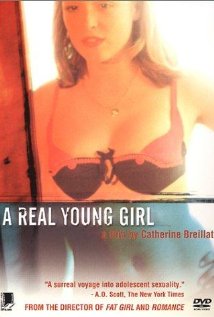
A REAL YOUNG GIRL
France, 1976, 90 minutes, Colour.
Charlotte Alexandra, Hiram Keller, Rita Meiden, Bruno Balp, Shirley Stoller.
Directed by Catherine Breillat.
When it was first made in the 1970s, French officials banned the film from public screening, with its sexuality topic, the sexual awakening of a teenage girl, as well as the very explicit close-ups of bodies and sexual activity.
It was based on a novel by the director, Catherine Breillat, who began a 40 years long career in making films that were particularly explicit, usually tackling sexually provocative themes. They include Romance, Sex is Comedy, And Anatomy of Hell, and more successfully dramatic films like A Ma Soeur and The Last Mistress.
It is not surprising to find that this was the director’s first film. In many ways, the film-making is very basic, standard setups, close-ups, and an editing patten that is too strong on fadeouts, highlighting how little many of the sequences lead into the ensuing sequences. While the framework is of a summer holiday, the young girl, Alice, returning to her home and farm, bored with nothing to do, preoccupied with herself, her body, sexual functions, and a belated attraction to a young man, Hiram Keller (star of Fellini Satyricon), who works at the mill. She is antagonistic towards her mother, who controls the household, is busy tidying things up, cooking and reprimanding her daughter whom she considers a failure. The father is much more good-natured, working in his garage, under the control of his wife, yet having a young girl on the side (with a few more explicit sequences and body glimpses) and a final confrontation with his wife. He seems devoted to his daughter.
The film is set in the 1960s and there is some allusion to political difficulties with the end of the era of Charles de Gaulle and references to the war and Petain and the Vichy government.
After many decades, the film scarcely seems provocative given so many other films of this nature and of the director’s own series of films. It does not seem particularly helpful in terms of psychology, even with Alice looking at herself, fingering herself, and all kinds of implements for sexual arousal. Whether she is any the wiser, we do not know – and there is a melodramatic ending when, suddenly, Hiram Keller is found dead.
Probably, the film contributes little to understanding of psychology and sexology – and it is more a film of historical interest because of the work of Catharine Breillat.
Published in Movie Reviews
Published in
Movie Reviews
Tagged under